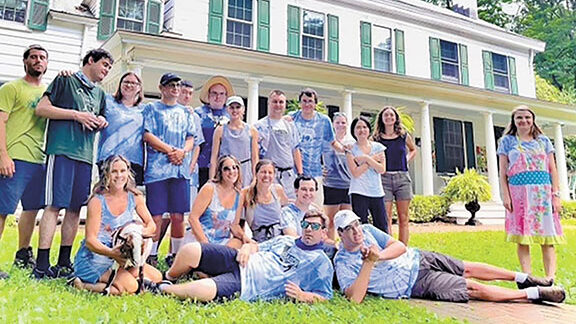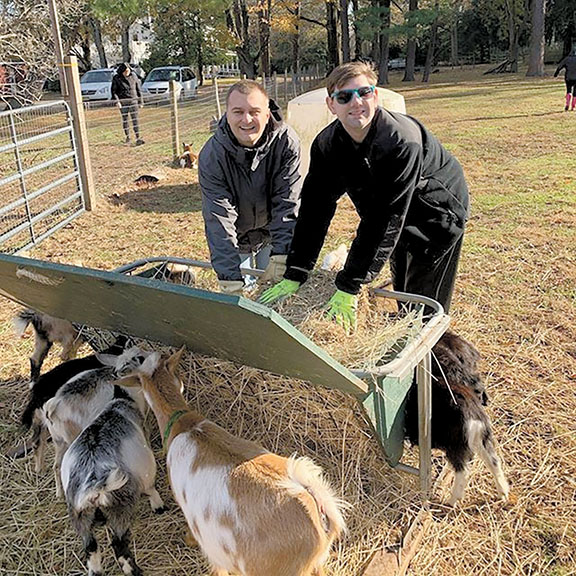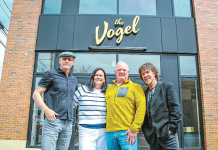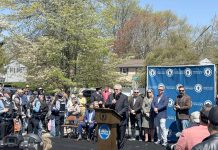
By Gloria Stravelli
MIDDLETOWN – The pace of life quickens at Oasis tlc farmstead as spring arrives. This year, a sense of excitement is in the air as well, as the nonprofit expands its therapeutic program for young adults with autism and celebrates Autism Acceptance Month with special events.
“We just have been getting more applications than we can manage and so we are expanding,” said Mai Cleary, a founder and president of Oasis tlc (therapeutic learning center). They are also mentoring other parent groups to help them start similar programs.
“Right before the pandemic hit we started a parent panel because what we’re realizing is we can only run so many programs,” Cleary said.
According to the website, Oasis tlc offers post-high school programs to “promote inclusion and acceptance of autistic individuals in their local communities by establishing environmentally exemplary farm centers that provide meaningful work, peaceful and healthy residences and community interactions.”
Cleary said it’s a “program for life for those who like the farm life.”
The transitional program focuses on four areas that are not normally a priority in public schools: formal social skills training; word usage and comprehension; vocational skills; and independent living skills.
“For me, what I think the focus should be during Autism Awareness Month is that the farmstead model is a really good model for people with autism,” Cleary said.
“It’s a very therapeutic lifestyle, but it’s naturally therapeutic.”
Occupational therapy happens when program participants latch and unlatch gates or make their own food. Because autistic people can be highly sensitive to sights and sounds, she said the programs emphasize sensory integration. “On a farm there’s so much sensory stuff going on, but it’s all natural sensory experience,” Cleary explained.

Some autistic people can have difficulty communicating, she said. “So if they can feel like they’ve done something, planted a seed, picked a tomato, done something with it in the kitchen and then served it to people, their self-esteem is boosted.”
Staff and volunteers try to fill the days with all kinds of activities, like woodshop and weaving, and tending the gardens and greenhouses and all the animals, Cleary said.
“The art program has been huge,” she added. “We have Sarah Hilton teaching. She came to the door the first day we opened and said, ‘I’ll teach your students for free.’ ”
Oasis tlc also offers activities for the community that act as fundraisers for the nonprofit. Autism Acceptance Month sees the return of the popular goat yoga classes starting Saturday, April 30, at the farm at 89 Sleepy Hollow Road, Red Bank. The classes raise funds for the farmstead and attendees are encouraged to visit the Oasis store and art gallery following class.
Another highlight is the joint Oasis tlc and Carton Brewing Beer Tasting and Art Oasis Show and Sale taking place from 3 to 7 p.m. Saturday, May 7 at 911 Navesink River Road in Locust. Hops for the beer were grown on the Oasis farm. The art show will feature original artwork and handcrafted works by Oasis students.
Another event that will bring visitors to the farm is a Mother’s Day Luncheon. More information on upcoming events and tickets can be found at oasistlc.org.
Volunteers at Oasis are plentiful. “We have retired people who volunteer for us,” said Barbara D’Augusta, one of the founders and secretary of Oasis tlc. “The woodshop instructor, a masseuse, volunteers for ceramics, an art teacher. We’re also able to take some students from local colleges as interns.”
D’Augusta’s son is part of the Oasis tlc program. “Transitions are tough,” she said of her son’s first year at Oasis. “It was a challenge, but it met his needs. He can’t run out the door fast enough to go there. He’s kept busy, the staff are amazing.
“The very first year I was so moved by how other students in the program were there for him,” she said.
“He is thriving at the program. The staff are so respectful and kind,” she added. “I’ve met the most beautiful people because of this.”
Liz Smith, another founder and vice president of Oasis tlc, explained the therapeutic program began at a 7-acre farm tract at Stevenson Park in Middletown, then moved to Sleepy Hollow Farm in Locust.

“Middletown leased the land to us on a yearly basis,” she said. “That’s where our young adults learned farming skills. We planted crops there, held volunteer days.”
Cleary, Smith and D’Augusta were members of the autism advocacy group Impact Oasis, which was an initiative to encourage appropriate programming at local schools.
“We were all part of Impact (Oasis) when it formed in 1998,” said Smith, adding that Middletown already had a “pretty developed” program for students with autism in the school district at the time.
“There were essay contests, assemblies, we visited every school parent group in Middletown trying to get the word out. One of our purposes was to raise awareness, also just to make sure they had good educational services. We went to school board meetings, wrote letters,” she said.
The other purpose of Impact Oasis was as a parents’ support group. “We all got to know each other well, would do things together with our families,” Smith said. But as is the case with all students with autism, they eventually age out of school programs.
Smith said looking for – and not really finding – programs available for autistic adults, led to the development of Impact Oasis which is also celebrating the 10-year anniversary of its pilot year farming.
Cleary said her awareness that farm life nurtures people with autism came through growing up on a farm in Colts Neck. But she became frustrated when she saw small farms disappearing.
“I was like, ‘We can’t not have farms.’ ”
In addition to natural occupational therapy, working on a farm promotes a healthy lifestyle and can provide all people – including those with autism – with better sleep through physical labor.
Cleary explained that, while the community can come to the farm to visit, autistic people are interacting on a daily basis with animals, so it isn’t “over-stimulating.”
“The farm life works (because) they’re engaged over a long day and the anxiety goes way down and you can actually learn because you’re not anxious,” Cleary said.
“All the students are doing really well. We have 20 young adults right now. We haven’t had open enrollment because of COVID,” Cleary said.
She explained some students live at the farm while some are day students and plans call for growing capacity. The goal is to house all of the residents, she said.
The model has proved so successful that currently, Oasis tlc is supporting other groups beginning similar programs.
“We’re mentoring other groups to help them start,” Cleary said, “giving them all the information, how we did it. I think about five or six groups came to our parent panel and then COVID hit.” She explained that one of the first steps is helping group through the 501(c)(3) nonprofit organization application process.
The article originally appeared in the April 21 – 27, 2022 print edition of The Two River Times.














